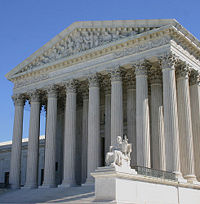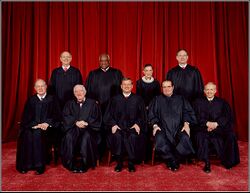Supreme Court of the United States: Difference between revisions
imported>Michel van der Hoek |
imported>Michel van der Hoek (→The Current Court: Updated with resignation of Souter and his replacement by Sotomayor) |
||
| Line 30: | Line 30: | ||
The current Chief Justice is [[John Roberts|John G. Roberts, Jr.]], whom [[George W. Bush]] appointed in September 2005. Roberts is a Harvard-trained lawyer and former Associate Counsel to the President. | The current Chief Justice is [[John Roberts|John G. Roberts, Jr.]], whom [[George W. Bush]] appointed in September 2005. Roberts is a Harvard-trained lawyer and former Associate Counsel to the President. | ||
The current associate Justices | The current associate Justices (in order of seniority) are: | ||
* [[John Paul Stevens]], a [[Gerald Ford|Ford]] appointee in 1975, and the longest serving current member of the court, having served on the [[Burger Court]] and the [[Rehnquist Court]]. Stevens is also the second oldest Supreme Court Justice in the history of the United States. | * [[John Paul Stevens]], a [[Gerald Ford|Ford]] appointee in 1975, and the longest serving current member of the court, having served on the [[Burger Court]] and the [[Rehnquist Court]]. Stevens is also the second oldest Supreme Court Justice in the history of the United States. | ||
* [[Antonin Scalia]], a [[Ronald Reagan|Reagan]] appointee in 1986, is a controversial jurist, the most prominent supporter of the concept of [[originalism]] and [[textualism]], and Roman Catholic. | * [[Antonin Scalia]], a [[Ronald Reagan|Reagan]] appointee in 1986, is a controversial jurist, the most prominent supporter of the concept of [[originalism]] and [[textualism]], and Roman Catholic. | ||
* [[Anthony Kennedy]], a 1988 [[Ronald Reagan|Reagan]] appointee, is a conservative and libertarian member of the Court, often serving as the swing vote on controversial decisions. | * [[Anthony Kennedy]], a 1988 [[Ronald Reagan|Reagan]] appointee, is a conservative and libertarian member of the Court, often serving as the swing vote on controversial decisions. | ||
* [[Clarence Thomas]], a 1991 [[George H. W. Bush]] appointee, is the second African-American to serve on the Supreme Court after [[Thurgood Marshall]], and has a conservative judicial philosophy, adhering to [[originalism]]. | * [[Clarence Thomas]], a 1991 [[George H. W. Bush]] appointee, is the second African-American to serve on the Supreme Court after [[Thurgood Marshall]], and has a conservative judicial philosophy, adhering to [[originalism]]. | ||
* [[Ruth Bader Ginsburg]], a 1993 [[Bill Clinton|Clinton]] appointee, is the second woman to serve on the Supreme Court (the first being the recently retired [[Sandra Day O'Connor]]). | * [[Ruth Bader Ginsburg]], a 1993 [[Bill Clinton|Clinton]] appointee, is the second woman to serve on the Supreme Court (the first being the recently retired [[Sandra Day O'Connor]]). | ||
* [[Stephen Breyer]], a 1994 [[Bill Clinton|Clinton]] appointee, and the leading liberal Justice on the court. He has indicated he will be retiring at the end of the 2008 session of the court. | * [[Stephen Breyer]], a 1994 [[Bill Clinton|Clinton]] appointee, and the leading liberal Justice on the court. He has indicated he will be retiring at the end of the 2008 session of the court. | ||
* [[Samuel Alito]], a 2006 [[George W. Bush]] appointee, a conservative Catholic, nominated after Bush failed to nominate [[Harriet Miers]] to the court. | * [[Samuel Alito]], a 2006 [[George W. Bush]] appointee, a conservative Catholic, nominated after Bush failed to nominate [[Harriet Miers]] to the court. | ||
* [[Sonia Sotomayor]], was appointed in 2009 by [[Barack Obama]]. She is the first Hispanic and only the third woman to serve on the Court. | |||
==Supreme Court Justices== | ==Supreme Court Justices== | ||
Revision as of 18:54, 9 August 2009
The Supreme Court of the United States of America is the highest federal court in the United States. It consists of nine justices, including a Chief Justice and eight associate justices. Justices are nominated by the President and confirmed by the Senate. Article Three of the U.S. Constitution defines the original and appellate jurisdiction of the Supreme Court, which includes appeals of federal and state cases and trials of cases where a State or foreign ambassador is a party, although the Eleventh Amendment somewhat limits the jurisdiction of federal courts. There is no constitutional specification of how many justices make up the Court, and Congress increased the number as the nation grew.
History
Establishment
The Supreme Court is the only court that is provided for specifically in the Constitution, which, in Article III section 1, vests the United States government's judicial power in "one Supreme Court, and in such inferior courts as the Congress may from time to time ordain and establish."
In the Judiciary Act of 1789, Congress determined that the Supreme Court would consist of a chief justice and five associate justices. The Supreme Court justices would meet in the national capital for two sessions each year and, when not in session, "ride circuit" to serve on intermediate appellate courts in the rest of the country.
From the John Jay Court to the John Marshall Court
The Taney Court
The Chase Court and the Waite Court
Melvin W. Fuller, Edward D. White, and William Howard Taft
The 1930s and FDR’s Court-Packing Plan
Earl Warren and Warren Burger
The Rehnquist Court
The Current Court
The current Chief Justice is John G. Roberts, Jr., whom George W. Bush appointed in September 2005. Roberts is a Harvard-trained lawyer and former Associate Counsel to the President.
The current associate Justices (in order of seniority) are:
- John Paul Stevens, a Ford appointee in 1975, and the longest serving current member of the court, having served on the Burger Court and the Rehnquist Court. Stevens is also the second oldest Supreme Court Justice in the history of the United States.
- Antonin Scalia, a Reagan appointee in 1986, is a controversial jurist, the most prominent supporter of the concept of originalism and textualism, and Roman Catholic.
- Anthony Kennedy, a 1988 Reagan appointee, is a conservative and libertarian member of the Court, often serving as the swing vote on controversial decisions.
- Clarence Thomas, a 1991 George H. W. Bush appointee, is the second African-American to serve on the Supreme Court after Thurgood Marshall, and has a conservative judicial philosophy, adhering to originalism.
- Ruth Bader Ginsburg, a 1993 Clinton appointee, is the second woman to serve on the Supreme Court (the first being the recently retired Sandra Day O'Connor).
- Stephen Breyer, a 1994 Clinton appointee, and the leading liberal Justice on the court. He has indicated he will be retiring at the end of the 2008 session of the court.
- Samuel Alito, a 2006 George W. Bush appointee, a conservative Catholic, nominated after Bush failed to nominate Harriet Miers to the court.
- Sonia Sotomayor, was appointed in 2009 by Barack Obama. She is the first Hispanic and only the third woman to serve on the Court.
Supreme Court Justices
Beginning dates reflect confirmation rather than the date of the oath of office.
| Appointing Presidents | Chief Justices | Associate Justices |
|---|---|---|
| George Washington | John Jay (1789-1795) John Rutledge (1795-1795) |
John Rutledge (1789-1791; later Chief Justice) William Cushing (1789-1810) |
| John Adams | John Marshall (1801-1836) | Bushrod Washington (1798-1829) Alfred Moore (1799-1804) |
| Thomas Jefferson | William Johnson (1804-1834) Henry Brockholst Livingston (1806-1823) | |
| James Madison | Gabriel Duvall (1811-1835) Joseph Story (1811-1845) | |
| James Monroe | Smith Thompson (1823-1843) | |
| John Quincy Adams | Robert Trimble (1826-1828) | |
| Andrew Jackson | Roger Brooke Taney (1836-1864) | John McLean (1829-1861) Henry Baldwin (1830-1844) |
| Martin Van Buren | John McKinley (1837-1852) Peter V. Daniel (1841-1860) | |
| John Tyler | Samuel Nelson (1845-1872) | |
| James K. Polk | Levi Woodbury (1845-1851) Robert C. Grier (1846-1870) | |
| Millard Fillmore | Benjamin R. Curtis (1851-1857) | |
| Franklin Pierce | John A. Campbell (1853-1861) | |
| James Buchanan | Nathan Clifford (1858-1881) | |
| Abraham Lincoln | Salmon P. Chase (1864-1874) | Noah H. Swayne (1862-1881) Samuel F. Miller (1862-1890) |
| Ulysses S. Grant | Morrison R. Waite (1874-1888) | William Strong (1870-1880) Joseph P. Bradley (1870-1892) |
| Rutherford B. Hayes | John Marshall Harlan (1877-1911) William B. Woods (1880-1887) | |
| James A. Garfield | Stanley Matthews (1881-1889) | |
| Chester A. Arthur | Horace Gray (1881-1902)
Samuel Blatchford (1882-1893) | |
| Grover Cleveland (first term) | Melville W. Fuller (1888-1910) | Lucius Q.C. Lamar (1888-1893) |
| Benjamin Harrison | David J. Brewer (1889-1910) Henry B. Brown (1890-1906) | |
| Grover Cleveland (second term) | Edward Douglass White (1894-1910; then Chief Justice) Rufus W. Peckham (1895-1909) | |
| William McKinley | Joseph McKenna (1898) | |
| Theodore Roosevelt | Oliver Wendell Holmes, Jr. (1902-1932) William R. Day (1903-1922) | |
| William Howard Taft | Edward Douglass White (1910-1921) | Horace H. Lurton (1909-1914) Charles Evans Hughes (1910-1916; later Chief Justice) |
| Woodrow Wilson | James C. McReynolds (1914-1914) Louis D. Brandeis (1916-1939) | |
| Warren G. Harding | William Howard Taft (1921-1930) | George Sutherland (1922-1938) Pierce Butler (1922-1939) |
| Calvin Coolidge | Harlan Fiske Stone (1925-1941; then Chief Justice) | |
| Herbert Hoover | Charles Evan Hughes (1930-1941) | Owen J. Roberts (1930-1945) Benjamin N. Cardozo (1932-1938) |
| Franklin D. Roosevelt | Harlan Fiske Stone (1941-1946) | Hugo L. Black (1937-1971) Stanley Forman Reed (1938-1957) |
| Harry S. Truman | Fred M. Vinson (1946-1953) | Harold H. Burton (1945-1958) Thomas C. Clark (1949-1967) |
| Dwight D. Eisenhower | Earl Warren (1953-1969) | John Marshall Harlan (1955) William J. Brennan, Jr. (1956-1990) |
| John F. Kennedy | Byron R. White (1962-1992) Arthur J. Goldberg (1962-1965) | |
| Lyndon B. Johnson | Abe Fortas (1965-1969) Thurgood Marshall (1967-1991) | |
| Richard M. Nixon | Warren E. Burger (1969-1986) | Harry A. Blackmun (1970-1994) Lewis F. Powell, Jr. (1971-1987) |
| Gerald R. Ford | John Paul Stevens (1975-present) | |
| Ronald Reagan | William H. Rehnquist (1986-2005) | Sandra Day O'Connor (1981-2006) Antonin Scalia (1986-present) |
| George H.W. Bush | David H. Souter (1990-2009) Clarence Thomas (1991-present) | |
| Bill Clinton | Ruth Bader Ginsburg (1993-present) Stephen G. Breyer (1994-present) | |
| George W. Bush | John G. Roberts, Jr. (2005-present) | Samuel Alito (2006-present) |
| Barack Obama | Sonia Sotomayor (2009-present) |

